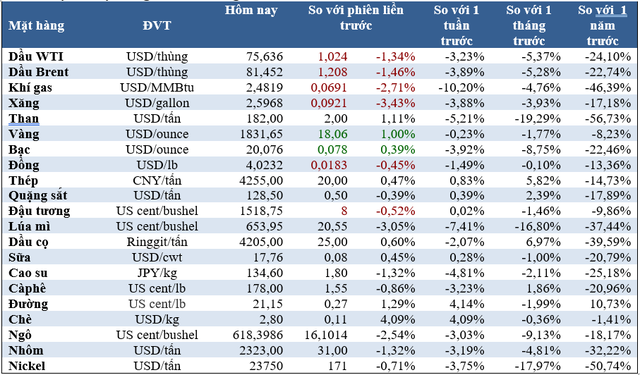Oil drops 1% to 2-week low
Oil prices fell about 1% to a two-week low on Thursday on growing concerns that the US Federal Reserve (Fed) may go too far in raising interest rates to keep inflation in check – which may be the case. economic downturn and reduce oil demand in the future.
Brent oil price ended the session down 1.07 USD, or 1.3%, at 81.59 USD/barrel, the lowest closing level since February 22; West Texas Intermediate (WTI) oil fell 94 US cents, or 1.2%, to $75.72, its lowest close since Feb. 27.
The number of Americans filing new jobless claims rose by the most in five months last week, but the underlying trend remains consistent with a tightening labor market.
Gold rises 1% as US jobs data soothes investors
Gold prices spiked on Thursday as the dollar fell after data showed US jobless claims rose more than expected last week, providing some hope to investors that a rate hike might not be enough. Federal Reserve may have less influence than feared.
Spot gold price increased 1.1% to 1,832.75 USD/ounce; April gold futures rose 0.9 percent to $1,834.60.
The dollar index fell 0.4%, making bullion a more attractive investment.
Copper falls on worries about Chinese demand and US interest rates
Copper prices fell on Thursday after Chinese economic data raised concerns about sluggish demand in the world’s top consumer of the metal, while US interest rates remained strong. .
Ending Thursday’s session on the London Metal Exchange (LME), copper for delivery in three months fell 0.7 percent to $8,848.50 a tonne.
Gold’s downtrend was capped by an increase in new US jobless claims that weighed on the dollar index. A weaker dollar makes goods denominated in U.S. currencies cheaper for buyers using other currencies.
Aluminum price this session also fell 1.1% to 2,328 USD/ton.
Corn falls on El Nino summer predictions, wheat and soybeans also fall
Corn futures on the Chicago Mercantile Exchange hit their lowest price since August as the outlook for seasonal weather in the US was more favorable following predictions that El Nino could arrive in the summer.
Meanwhile, wheat prices hit a new 18-month low on weak demand for US export wheat.
Soybean prices also fell in this session.
The most traded corn contract on the Chicago Board of Trade (CBOT) hit its lowest level since August 19 and fell 1.72% to $6.14-3/4 per bushel. Wheat prices hit their lowest levels since July 2021 and fell 2.47% to $6.70-1/2/bushel, while soybeans fell 0.23% to $15.14-1/4/ bushel.
Rubber fell for the 4th day in a row
Rubber futures prices in Japan fell on Thursday, as traders weighed indicators of stock market strength with a stronger yen and expectations of further interest rate hikes. according to the US.
Rubber contract for August delivery of the Osaka Exchange ended the session down 0.9 yen, or 0.4%, to 221.6 yen ($1.62)/kg.
Similarly, the rubber contract for May delivery on the Shanghai trading floor fell 185 CNY to 12,190 CNY (US$1,748.95)/ton.
Japan’s Nikkei average closed up 0.63%.
Reduced coffee
May arabica coffee futures fell 2.3 cents, or 1.3%, to $1,7505/lb, after hitting a four-week low of $1,7390 at one point.
ICE-certified arabica stocks have begun to rebound after falling to a year-low earlier this week, while another 38,533 60-kilogram bags are still being sorted.
* Monthly robusta coffee futures rose $9, or 0.4%, to $2,168 per ton, supported by tight supply at the world’s leading robusta coffee producer – Vietnam.
Palm oil reversed to rise again
The price of palm oil futures on the Malaysian market continued to decline at the beginning of the session on March 10, but then reversed the trend to bounce, ending the previous three-day losing streak as traders turned their focus to the market. Focus on upcoming palm oil board data.
The reference palm oil contract – for May delivery – on the Bursa Malaysia Derivatives Exchange closed up 24 ringgit, or 0.57%, to 4,204 ringgit ($930.29) a tonne.
Despite the rise, Dalian palm oil prices and weaker crude oil prices continue to put pressure on the palm oil market. However, the downside is expected to be capped by a weak ringgit and a sharp fall in February palm oil inventories.
The Malaysian Palm Oil Board (MPOB) is expected to release February supply and demand data on Friday.
Indonesia’s biodiesel policy and the possibility of El Nino weather patterns could further strain global palm oil stocks, lifting prices later this year, top officials and analysts in industry said at a conference on Wednesday.
Iron ore rose
Iron ore futures on the Dalian and Singapore bourses reversed their downtrend and rebounded on Thursday afternoon as data showing China’s steel output increased, fueling optimism.
The average output of China’s five main steel products, including rebar, coil, hot-rolled coil, cold-rolled coil and sheet steel in the week to March 9 increased by 49,000 tons from the previous week, to about 49,000 tons. 9.52 million tonnes, data from consulting firm Mysteel showed.
Iron ore for May delivery on China’s Dalian Commodity Exchange ended up 0.6 percent higher at 916.5 yuan ($131.45) a tonne.
On the Singapore Exchange, iron ore for April delivery was at $126.95/ton, up 0.09%.
Prices of some key items in the morning of March 10:

